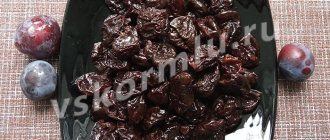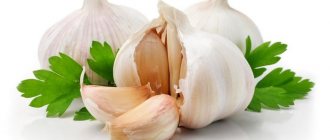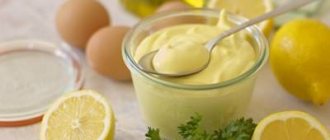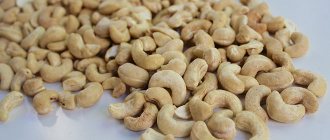Debunking myths
Myth No. 1: A nursing mother should sometimes drink wine because it improves blood formation and is generally beneficial.
Fact: The harm from drinking alcohol will be much greater than the benefit. It would be much wiser to improve blood composition by drinking pomegranate juice.
Myth No. 2: You can drink wine while breastfeeding because the baby will sleep better.
Fact: Your baby will fall asleep faster, this is true. But he won’t sleep well and for long. Dreams will become shallow, restless, and the baby will wake up frequently due to alcohol toxins.
Myth No. 3: You can’t drink wine, which means you can’t drink kefir. It also contains alcohol!
Fact: When breastfeeding, it is recommended to drink no more than 500 ml of kefir per day so that it does not cause colic, regurgitation, or problems with stool.
The drink is useful for restoring intestinal microflora in reasonable portions. At the production stage, milk is processed with special enzymes, so that the final product contains alcohol in minimal quantities - no more than 1%. Alcohol does not penetrate into milk at all. Therefore, it is not reasonable to compare kefir with wine.
Myths about wine while breastfeeding
Some people believe that the drink is beneficial during lactation. This is wrong. Common myths:
- “A little wine before bed will help your baby sleep better.” This misconception is based on the fact that the child falls asleep quickly. But the sleep is superficial. The child often wakes up and is capricious. This is due to the fact that alcohol negatively affects the fragile nervous system.
- "Wine improves blood circulation." The statement is correct, but it is better to replace the drink for this purpose with other products agreed upon with a specialist. Alcohol nullifies all valuable properties. The expected harm far outweighs the benefits.
- “Wine improves milk production.” Prolactin, which is responsible for the volume of secretion, is actually released more. But at the same time, the production of the hormone oxytocin is inhibited. As a result, the outflow of milk becomes very difficult. The risk of mastitis and lactostasis increases.
- “If you express milk after a feast, the next portion is safe for the baby.” It's a delusion. Until alcohol is removed from the blood, it will also be present in the milk.
Wine, like any other type of alcohol, is undesirable to drink during lactation. As a last resort, a glass of drink can be drunk on a full stomach, and the baby should not be put to the breast until the alcohol is removed from the body.
Is it allowed to drink
Some mothers completely give up any alcoholic beverages, alcohol-containing medications, and dessert sweets during lactation. This especially applies to those women who are aware of their dependence on alcohol. Modern mothers try to protect their children from the harm of alcohol.
Science has proven that alcohol passes into mother's milk in a matter of minutes. During lactation, a woman’s body absorbs wine in a short time and eliminates it slowly, which is why it is important to know how much of the drink you can drink.
Absorption of dry wine into the blood takes less than half an hour, and the sparkling drink will flow through the veins after ten minutes. Breast milk contains about 10% alcohol of the volume that enters the bloodstream.
Important! Fermentation processes of alcohol breakdown do not occur in the body of a newborn. Therefore, the minimum dose for an adult can be fatal for a child!
Ethanol molecules penetrate milk directly from the circulatory system, so abundant and frequent pumping during a feast will not in any way affect the acceleration of alcohol elimination. The release time of wine breakdown products directly depends on the volume of alcohol consumed. So, 2 glasses of dry wine will be eliminated from the body of a nursing mother for at least 6 hours.
Despite all the statements about the undoubted harm of alcoholic beverages during breastfeeding, many women still ignore the recommendations. In particular, they drink wine and champagne, which, according to many, do not pose a great danger to newborns.
Wine selection
You need to pay attention to the composition of the drink, turnover, and the reputation of the manufacturer. Cheap varieties have nothing in common with traditional wines prepared using special technology. A young mother is recommended to choose dry wine from elite brands. It is less likely to cause negative reactions.
Red wine
The drink contains many antioxidants that are good for health. White wine is inferior to red varieties in terms of the number of these compounds. This feature is associated with manufacturing technology. Red wine is made from whole grapes using skins and seeds. During the fermentation process, they saturate the infusion with useful elements.
The purported benefits of red wine for a breastfeeding woman are:
- has a good effect on the functioning of the heart and blood vessels;
- neutralizes free radicals that cause aging;
- destroys pathogenic microflora in the mouth;
- strengthens gums;
- prevents the growth of malignant tumors;
- is the prevention of stroke and heart attack.
However, the harm of the alcohol contained in the drink negates the valuable properties of the product. During breastfeeding, the female body reacts sharply to alcohol. Even a small amount of alcohol can provoke weakness, nausea, vomiting, and headache.
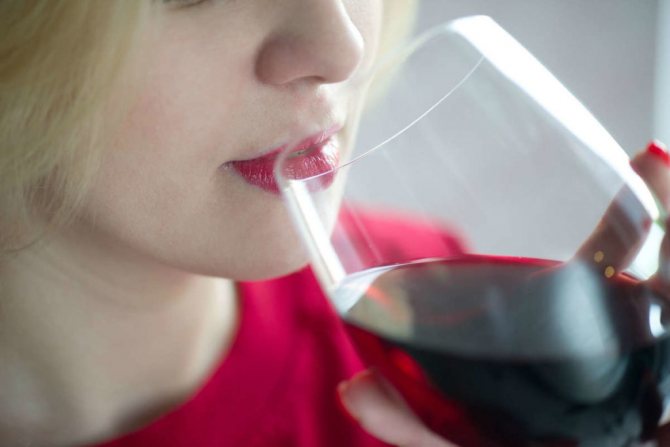
You still shouldn’t drink red wine during breastfeeding, replacing it with high-quality white wine.
White wine
The positive properties of a quality drink exceed the benefits of grape juice. White wine has an antiviral, bactericidal effect, and relieves inflammation. These varieties:
- accelerate metabolic processes;
- normalize cholesterol levels;
- improve digestion;
- remove radionuclides.
There will be benefits if you use them little by little in exceptional cases. Abuse of breastfeeding is dangerous for mother and baby. White wine causes undesirable effects in children, especially if the child is under 3 months old.
Non-alcoholic wine
A drink with a minimum alcohol concentration (about 0.5 vol.) is obtained by freezing or completely heating. As a result, the alcohol evaporates. This infusion does not last long. To increase shelf life, manufacturers add preservatives and plant hormones to non-alcoholic varieties. Food additives often cause unwanted reactions.
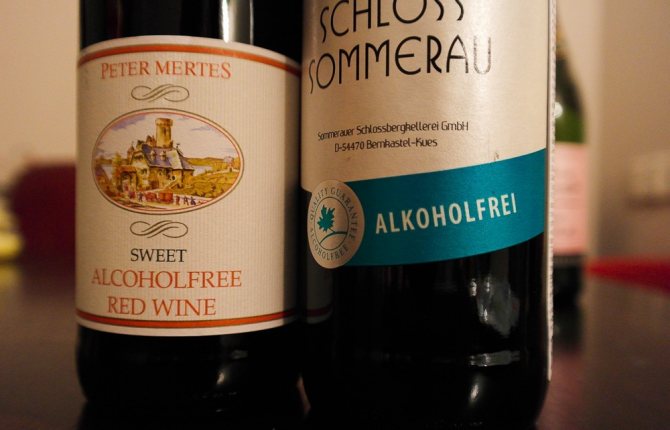
Due to the additives, preservatives and colorings it contains, non-alcoholic wine is not recommended for consumption by a nursing mother.
It is advisable to replace non-alcoholic wine with pomegranate juice and berry compote.
Is there a safe dose?
Good wine in maximum doses has a positive effect on blood vessels and the heart, lungs, and improves metabolism. But this does not apply to cheap substitutes. It is strictly forbidden to use them during lactation.

The same can be said about non-alcoholic wine, which contains only 0.5% alcohol. This drink contains a lot of chemical additives, dyes and preservatives. Homemade wine is more natural, but can be very strong. Therefore, drinking such a drink is possible if its degree is minimal.
Doctors say that a glass of wine with a capacity of 50 g can be drunk if the baby is already six months old. If the child is younger, then even a sip of the drink is toxic for him. It is better to drink high-quality dry white wine from natural products with a minimum degree.
Before drinking wine, you need to breastfeed your baby and eat a hearty meal yourself to reduce the amount of alcohol absorbed. You can also pre-express milk or purchase formula for your baby. You can feed him with your milk again no earlier than after 3 hours.
If after drinking alcohol the mother feels dizzy, nauseous or drowsy, then it is not advisable for her to feed the baby. Otherwise, he will receive severe poisoning, which may result in death.
You will have to wait about a day for the woman’s body to return to normal. At this time, the baby must be fed with pre-prepared expressed milk and supplemented with formula milk. You need to express again every 6 hours to avoid mastitis and stagnation of milk.
How long after you can feed your baby after drinking alcohol?
Only the lazy ones haven’t talked about the harmful effects of alcohol on the body of infants. But a young mother, leaving the maternity hospital, does not lock herself within four walls. Life goes on as usual, and nursing mothers periodically find themselves in a cheerful company at a feast for the next occasion.
What to do - be a teetotal black sheep or succumb to the general fun? But is it possible to drink wine while breastfeeding? But what about the baby waiting at home? Will his mother’s “libation” harm him? What about your neighbors at the table? Will they look askance at the “drinking” mother? All these thoughts rush through a woman’s head like a whirlwind, but where is the truth? In wine?
Alcohol in breastfeeding mother's milk
Does alcohol actually enter the baby's body with wine during breastfeeding? Of course, some alcohol passes into breast milk (about a tenth of everything drunk).
When breastfeeding, there is a very high probability of alcohol entering the baby's body.
The concentration of alcohol in the body of women on breastfeeding is lower than that of non-breastfeeding women. At the same time, the amount drunk by both women is the same. The reason for this phenomenon is unknown. Apparently, nature itself made sure that the presence of lactation seemed to reduce alcohol concentration.
So, alcohol and its breakdown products will, of course, be eliminated from the body of a nursing mother over time.
It is important to take into account that the more alcohol you drink, the longer it takes for the alcohol to be removed from the mother’s and child’s body. In addition, if the mother has a miniature body constitution, this process may take some more time.
The fact that alcohol is harmful to babies is an undeniable truth. Therefore, before drinking wine, and especially stronger drinks, it is worth considering all possible nuances and consequences.
Is it possible to drink wine while breastfeeding?
So, can nursing mothers drink wine? Of course, if we talk about the strength of alcohol, then it is much better to limit yourself to a glass of wine rather than more radical drinks.
It is important to understand that the appearance of alcohol in the body of a nursing mother can provoke a number of negative consequences, namely:
- Alcohol can change the taste of mother's milk, which increases the risk of baby weaning.
- The toxins in alcohol cause damage to the child's nervous system. As a result, sleep disturbances may occur in the infant.
- The negative impact of toxic substances in alcohol can manifest itself in the form of gastrointestinal problems in the form of nausea, vomiting and dysbiosis.
- Strong drinks make the baby lethargic, cause hypotension, increased heart rate and slowed reactions. Medicine knows of cases where maternal alcoholism became the cause of the development of oligophrenia in a child.
- Alcohol can reduce the amount of breast milk produced. This may cause unscheduled termination of lactation.
The well-known doctor Komarovsky allows alcohol in small quantities during breastfeeding.
But at the same time he emphasizes that the frequency of such techniques should not exceed acceptable standards. In addition, you should carefully choose weak drinks. The volume of alcohol consumed is also of enormous importance.
Many mothers believe that non-alcoholic wine and healthy foods will help reduce the negative effects of alcohol on the body. A balanced diet, of course, will benefit both the mother and child's body.
But you shouldn’t be fooled about non-alcoholic wine. It also contains ethanol, although in a very small concentration - only 0.5%. This is very little, and such a drink is unlikely to harm a newborn. Still, you shouldn’t drink it in buckets.
Summarizing all the data, we can conclude that it is undesirable to drink wine during hepatitis B, but it is quite acceptable.
It is important to drink in moderation, not drink alcoholic beverages too often and adhere to special safety recommendations.
Basic safety rules
The baby can be protected from the elements of alcohol entering his body. This can be achieved by considering the following tips:
- You need to attach the baby to your chest immediately before the feast;
- It is unacceptable for a nursing mother to drink wine on an empty stomach;
- you should not drink any alcohol in the first three months of the child’s life;
- Having allowed herself to drink wine, a woman should avoid breastfeeding for several hours (see the table below: how much alcohol is removed from the body).
Red or white
Red wine is the most suitable alcohol option for nursing mothers, so to speak about alcoholic beverages.
The grapes used to make it ferment together with the skins and seeds. This means that such a drink contains antioxidants that have a beneficial effect on the body.
White wine has a positive effect on metabolism and lung function. However, during its production, the grape skins are separated from the pulp and seeds. As a result, the drink loses some of its nutrients.
But on the other hand, red wine is slightly more allergenic than white wine. So here you should be guided by the preferences and desires of the mother.
By drinking high-quality (!), preferably dry wine, a nursing mother will cause less harm to her and her child’s body than when drinking stronger drinks (cognac, vodka, etc.). Pomegranate juice, mineral water, juices and compotes will be good and, most importantly, safe alternatives to wine.
How and how much
The amount of alcohol consumed largely determines the condition of both mother and child. Thus, the optimal dose of wine during breastfeeding is 50 g for mothers of babies up to six months. Once your child reaches this age, you can drink a glass of wine.
How often can you drink wine while breastfeeding?
Experts say that the frequency of such “methods” should not exceed one glass 1-2 times a week.
Do I need to pump?
Drinking wine during breastfeeding and expressing afterward is absolutely pointless. Alcohol will disappear from milk after the same period of time as from blood. But expressing into a bottle before drinking alcohol is quite acceptable.
This will solve the problem of feeding the baby without applying to the “drunk” breast. Sometimes it may be necessary to pump after drinking alcohol to prevent breast hardening, lactostasis and mastitis. Milk expressed in such cases should never be given to the baby.
Alcohol enters a woman’s body within a few minutes after drinking the drink. How long after can you breastfeed your baby? As a rule, alcohol is eliminated from the body within 3 hours (we are talking about one glass of wine drunk).
The time may vary depending on the woman’s weight and the amount of alcohol consumed.
In any case, it is recommended to refrain from feeding for the next 2.5-3 hours. Otherwise, there is a high risk of alcohol entering the baby’s body during lactation.
Of course, ideally, a nursing mother should stop drinking alcoholic beverages (and in the first months of a baby’s life, this is a must!). But in the bustle of days filled with worries about the baby, a young mother sometimes really wants to relax and take a little break from the daily routine.
In such cases, a glass of good wine will help her ease the burden of responsibility a little.
It is important to follow all recommendations for feeding your baby in case of alcohol consumption and not to allow too frequent “libations.” https://progrudnoe.ru
Impact on the child
The baby can refuse the breast forever if it is attached after drinking alcohol. This happens because alcohol changes the taste of milk. In addition, wine can provoke an allergic reaction or increase intolerance to foods eaten and cause cross-allergy.
Alcohol has the following effects on the body of an infant:
- causes a decrease in immune defense;
- provokes delays in intellectual development, concentration, memory and speech;
- destroys cells of the cerebral cortex;
- causes lethargy and drowsiness.
Many people are interested in how long it takes to start using it - up to 3 months, the baby’s liver has not yet formed and does not know how to process even small doses of ethanol.
Reviews from young mothers
On the Internet you can find many forums and individual comments on articles about drinking wine during lactation. Sometimes very unexpected and even shocking stories are discovered.
Maria: I breastfed for 18 months and didn’t drink anything - neither natural, nor homemade, nor store-bought alcohol. I didn't even want to. After completing lactation, I tried some cherry wine at a friends party, which they prepared themselves. Although the strength there was, as they said, meager, I was carried away from one glass.
Olga: A glass of wine or 5 cigarettes can help me when my husband pushes me. Mental health is also important. And that’s why I think it’s better to drink and smoke, and then enjoy the smiles of the child. My husband usually pisses me off on the weekends when he’s at home with us. If you want, scold me, but I know what’s best for me. With a satisfied mother, the baby will be happy.
Regina: Now there are young women all around and everywhere who, after the birth of a child, imagine themselves to be the center of correctness and purity. They poison the husband with their instructions, then the children, in the end, are left alone. What I mean is that any madness must have a limit. If you want a drink, drink it, but don’t harm anyone.
Evgenia: During pregnancy, I allowed myself half a glass of wine. But then I was ashamed in front of my baby. Now she is already 9 months old, I don’t drink at all. On New Year's Day, a friend spent the night with her one-year-old son and drank almost one bottle of wine. She didn’t want to take the mixture from me. She said that she would not feed her son this “badass”. And for some reason she doesn’t consider her “drunk” milk to be poison.
Is it possible to drink wine while breastfeeding?
Ethanol penetrates milk and spoils its taste. After feeding, the child’s body receives a dose of harmful compounds. There are not enough enzymes in the baby’s gastrointestinal tract to break down alcohol molecules, so they linger in the body for a long time. The consequences of alcohol for a child’s body are as follows:
- destruction of liver and brain cells;
- nervous system disorders – apathy, tearfulness, lethargy;
- decreased blood pressure;
- tachycardia;
- colic;
- rash;
- increased gas formation;
- decreased appetite;
- sleep disturbance;
- weakening of defensive reactions.
The alcohol enters the milk 20-30 minutes after drinking the drink. Sparkling wine and champagne are absorbed faster due to carbon dioxide bubbles. If a nursing mother drinks a glass of drink, the alcohol will be removed from the blood within 3-4 hours. The exact time depends on the quality of alcohol, the woman’s weight, and type of diet.
READ MORE: Can a nursing mother drink alcohol: if so, what kind and how much?
It is best to postpone taking alcoholic drinks until the baby is introduced to complementary foods. The frequency of applications will be reduced. After 6-7 months, a woman can afford a little wine without consequences for the child.
Rules of use
A nursing mother is allowed to drink no more than 150 ml of wine. The baby needs to be fed first so that there is enough time left before the next feeding.
Rules for drinking wine during lactation:
- preference is given to white dry varieties of good quality. These brands are less likely to cause allergic reactions;
- It is advisable to eat a hearty meal before drinking alcohol. Ethanol is absorbed faster on a full stomach;
- after drinking wine, do not put the baby to the breast for 3-4 hours;
- You cannot eat new foods on this day. This will reduce the load on the baby’s gastrointestinal tract;
- If a child is mixed-fed, it is advisable to give him only formula on a holiday. At the same time, milk is periodically expressed to prevent stagnation and a decrease in lactation.
Until the child is 3 months old, you should give up alcohol. Even a small portion can cause severe intoxication and, as a result, chronic diseases.
Important information
It is advisable to replace wine during lactation with pomegranate juice or kefir. Alcohol has a detrimental effect on a child, causing him allergies, nausea, anxiety, health and development problems.
Sometimes ethanol molecules in large quantities cause the death of a baby. The harm to a child from alcohol drunk by a nursing mother is undeniable.
During the holidays, you can afford a safe dose of natural wine without additives, provided that the child is six months old and has expressed milk or formula in stock for him. And if you have psychological problems, it is better to consult a psychologist rather than solve them with alcohol or cigarettes.
Remember that the health of the child depends on maternal care and the relationship between parents.
In contact with
